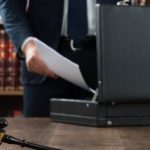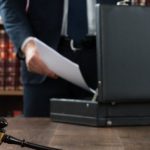NSW Lawyer Struck Off and Prosecuted For Fraud

When applying to be admitted into the Australian legal profession, law graduates are required to undergo a character test to determine whether they are a “fit and proper person” to engage in legal practise.
However, there are lawyers who – in the course of practising the law – breach the trust given to them by the community and their clients. Sydney lawyer Michael Leon Kinchington is an example of a NSW lawyer who operated outside the boundaries of both professional ethics and the law.
A dodgy cost agreement
On 17 August 2010, a client engaged the services of Mr Kinchington at his Hornsby law firm in relation to criminal charges that had been laid against him. The next month, the client signed a cost agreement.
At the time, the client indicated an intention to plead not guilty to the charges, and the matter was listed for a ten day trial in the Downing Centre District Court on 16 May 2011.
On 17 February 2011, the client signed an amended cost agreement. Under the title “Estimate of Costs” was written “we have reserved the days of 10 May 2011 to 27 May 2011 as an allocated period … we will charge our daily rate for those days that we appear in court.”
Mr Kinchington subsequently produced a second amended cost agreement dated 5 May 2011, which stated, “We have reserved the days of 10 May 2011 to 27 May 2011 as an allocated period … we will charge our daily rate for those ten (10) days set down for trial in any case.”
The actual date of the creation of this second amended agreement is unknown, but the inference was that its preparation took place at a later time. The estimated fees on this agreement were at least $15,232 more than the estimate on the earlier amended agreement.
A doctored signature
By mid-April 2011, the client and his partner deposited $89,919 into the lawyer’s trust account, to cover preparations and the trial.
Negotiations then occurred for a plea of guilty to a lesser charge. Those negotiations were concluded on 16 May and a formal plea of guilty was entered two days later. The case was then adjourned for sentencing on a later date.
Mr Kinchington then withdrew funds from the trust account in accordance with the second amended cost agreement, which exceeded that which he would have been entitled to withdraw under the first amended cost agreement.
On 2 November, the client’s partner lodged a complaint with the Office of the Legal Services Commissioner, asserting that Mr Kinchington had engaged in overcharging, provided inferior services, refused to refund money held in trust and had misled them.
Enquiries by the Commissioner revealed the lawyer had not obtained his client’s agreement to the second amended document, and it became evident the lawyer had gone so far as to cut and paste his client’s signature and insert it into the agreement.
Mr Kinchington, however, maintained that his client had signed the agreement on 6 May 2011. And on 19 March 2012, the client’s partner made a complaint to Hornsby police that the lawyer had engaged in fraud.
The fraud confirmed
Mr Kinchington wrote to the Legal Services Commissioner on March 2012 and again in May that year, asserting that his client had signed the second amended cost agreement. He claimed that he was unable to supply the original as he only had space to store scanned documents, and all originals were shredded.
The Commissioner recommended that the Law Society’s Professional Standards Department investigate the complaint, as the signature on both amended documents appeared identical. A document examiner later confirmed the signature on the second retainer was copied and pasted from the first.
The findings of the document examiner were sent to the lawyer, who twice replied to the Law Society in May and September 2013, denying that he falsified the document. However, a NSW police Forensic Services investigation came to the same conclusion as the document examiner.
The sentence
On 26 August 2014, Kinchington was charged with using a false document to obtain a financial advantage, under section 254(b)(ii) of the Crimes Act 1900. The offence carries a maximum penalty of 10 years behind bars.
All lawyers in our state are prohibited from engaging in conduct which demonstrates they are not fit and proper to practise law, or which is likely to a material degree to:
- be prejudicial to, or diminish the public confidence in, the administration of justice, or
- bring the profession into disrepute.
And like current practising rules, the now repealed Legal Profession Act 2004 made it necessary for all holders of practising certificates to provide written notice to the Council of the Law Society of NSW within seven days of being charged with a serious offence. Failure to do so amounts to professional misconduct.
Mr Kinchington failed to notify the Law Society of the charge against him within the required timeframe. In fact, he only notified them of the charge after the Society contacted him to o specifically seek disclosure.
The charge was subsequently changed to the offence of publishing a false or misleading statement with the intention of obtaining a financial advantage, under section 192G(b) of the Crimes Act. The maximum penalty for that offence is 5 years imprisonment.
The charge was then varied due to the inability of the prosecution to identify the date on which the second amended cost agreement had been produced.
Mr Kinchington pleaded guilty to the charge on 12 October 2015 in the NSW Local Court and tendered a cheque to the court for the financial advantage he obtained.
On 2 February 2016, he was convicted and sentenced to 12 months imprisonment, which was then suspended in accordance with section 12 of the Crimes (Sentencing Procedure) Act 1999.
Law Society takes action
The Council of the Law Society of NSW brought a case against Mr Kinchington in the NSW Court of Appeal (NSWCA) on 12 October last year. The case was heard by NSWCA Justices John Basten, Robert Macfarlan and Julie Ward.
Mr Kinchington did not attend the proceedings and played no part in them.
The Council sought orders against him over five matters, which included preparing the false cost agreement, and charging professional fees for the entire trial period.
The Council also raised the issues of the false and misleading comments made to the Legal Services Commissioner and the Law Society.
The findings of the appeals court
“It is well established that fitness to practise law carries with it as an essential characteristic, that the person concerned exhibit honesty and integrity,” the panel of justices explained. Their Honours outlined four interrelated matters involved in this requirement:
- clients must feel secure when dealing with lawyers,
- fellow legal professionals must be able to depend on the word of their colleagues,
- the public must have confidence in the profession, and
- the judiciary must be confident about those who appear before it in the courts.
The court noted that Kinchington’s initial deception was exacerbated by his false statements after investigations were underway, which continued for over two years. The justices also noted the offender’s failure to inform the Law Society of his criminal charges.
“That course of conduct is indicative of a lack of that good fame and character which is a necessary precondition to the practise of law,” the court determined.
“The period of misconduct, unaccompanied by any explanation, warrants the conclusion that the respondent is not a person of good fame and character.”
Struck off
The NSWCA ultimately found the lawyer guilty of professional misconduct, as he was “not a person of good fame and character and is not a fit and proper person” for the purposes of legal practise..
The court ordered that Kinchington be removed from the roll of Australian lawyers, or ‘struck off’, pursuant to section 22 of the Legal Profession Uniform Law.
He was also ordered to pay the legal costs of the Council of the Law Society of NSW.








